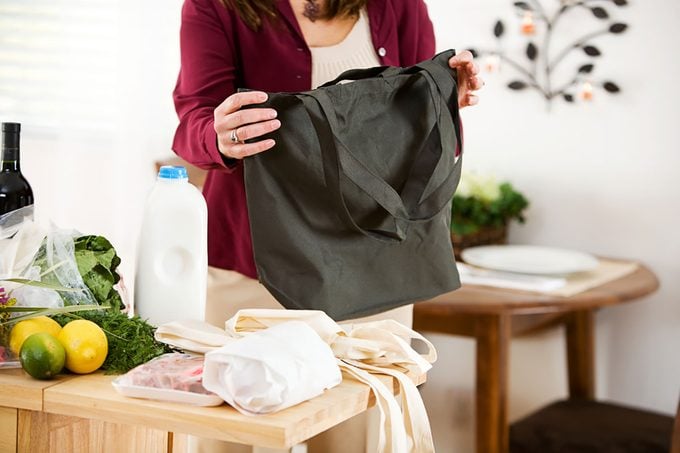Your Reusable Shopping Bags Are Actually Really, Really Dirty
Updated: Mar. 11, 2018
Using reusable grocery bags cuts down on waste and saves money. But not giving them the TLC they deserve can be hazardous for your health. Here's how.

Want to make the world a better, greener place? Use a reusable shopping bag.
Trotting your veggies and cream cheese home in an eco-friendly cloth bag cuts down on waste and—since some stores now charge for paper or plastic—saves you money.
But have you ever thought about how clean those totes are? We hadn’t. Now that we’re faced with the cold, hard facts, we know that neglecting them can be hazardous to our health.
Fact: Your Reusable Shopping Bags Are Dirty
And we mean really dirty. In a study conducted by researchers at the University of Arizona and Loma Linda University, almost all the reusable shopping bags tested were jam-packed with bacteria. Half the bags had traces of coliform bacteria, while 12 percent tested positive for E. coli. To make matters worse, a recent study by the United Kingdom’s Food Standards Agency reported that totes used to carry raw meat or fish can spread bacteria that can lead to fatal food poisoning.
When you think about it, it’s not that shocking. You put your grocery bags virtually everywhere: in a public shopping cart, the back of your car (you know, where Fido sits during long car rides) and on your counters, which are wiped clean with a mind-bogglingly unsanitary sponge. To make matters worse, your bags are filled with unwashed vegetables and possibly broken eggs and leaky meat packages. If you don’t clean your reusable shopping bags, you run the risk of getting sick—or worse.
How to Clean Your Reusable Shopping Bags
The good news is your reusable shopping bags can be salvaged. Simply washing your bags will kill more than 99.9 percent of harmful bacteria. Phew. You can throw cloth and canvas bags in the laundry—we suggest you wash and dry them separately from your clothes, and with a lot of warm, soapy water—but you’ll need to wash polypropylene bags by hand. Once you’ve cleaned your bags, store them in a dry, cool place until your next trip to the grocery.
As for how often you should wash your bags? For ultimate peace of mind, we recommend cleaning them after each grocery trip. Better safe than sorry!
Know When to Use Disposable
Since the deadliest bacteria come from raw food, we suggest packing foods like burger patties, salmon fillets and, yes, even egg cartons separately. You could bring a separate reusable bag for your proteins, but if you want to err on the side of caution, place them in a disposable paper or plastic shopping bag. It’s not the most environmentally or economically sound option, but avoiding cross-contaminated food could be a matter of life or death. So we think both Mother Nature and your wallet will forgive you.
For more ways to make your next trip to the grocery store a breeze, check out our genius hacks for grocery shopping like a pro.
